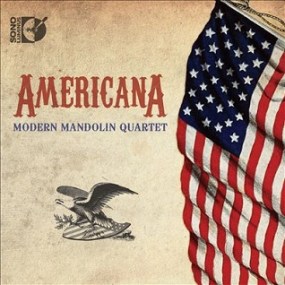Second Inversion hosts share a favorite selection from their weekly playlist. Tune in on Friday, September 1 to hear these pieces and plenty of other new and unusual music from all corners of the classical genre!
Philip Glass: Mad Rush (Sony Classical)
Philip Glass, piano
 Half hypnotic, half neurotic, Philip Glass’s Mad Rush for solo piano is a minimalist masterpiece. He first premiered the piece in 1979 for the Dalai Lama’s first public address in North America—because his actual arrival time was so vague, they needed music that could be stretched for an indefinite period of time. Thus was born one of the most iconic piano pieces of the late 20th century.
Half hypnotic, half neurotic, Philip Glass’s Mad Rush for solo piano is a minimalist masterpiece. He first premiered the piece in 1979 for the Dalai Lama’s first public address in North America—because his actual arrival time was so vague, they needed music that could be stretched for an indefinite period of time. Thus was born one of the most iconic piano pieces of the late 20th century.
Performed here by the composer himself, the densely layered arpeggios circle and surround you, lifting you into a trance that almost seems to suspend time itself. – Maggie Molloy
Tune in to Second Inversion in the 2pm hour today to hear this piece.
David Lang: cage (in memory of john cage) (Warner Classics)
Conrad Tao, piano
 It’s been becoming increasingly clear to me lately that John Cage’s music can be an extremely powerful gateway into a different universe of listening. So, pieces like this one make more sense to me now than they used to. This piece, like Cage’s music, is an inducement to listen with open ears – a reminder to hear music for what it is. – Seth Tompkins
It’s been becoming increasingly clear to me lately that John Cage’s music can be an extremely powerful gateway into a different universe of listening. So, pieces like this one make more sense to me now than they used to. This piece, like Cage’s music, is an inducement to listen with open ears – a reminder to hear music for what it is. – Seth Tompkins
Tune in to Second Inversion in the 6pm hour today to hear this piece.
George Shearing: “Sigh No More Ladies, Sigh No More” (Grouse Records)
Vancouver Chamber Choir; Jon Washburn, conductor
Don Pedro: By my troth, a good song.
Balthasar: And an ill singer, my lord.
No ill singers here! This fun, jazzy version of “Sigh No More Ladies, Sigh No More” from Shakespeare’s Much Ado About Nothing is sung gloriously by the Vancouver Chamber Choir. The lyrics are… less glorious. In the play, Balthasar croons that women should accept men for their cheating and bad behavior rather than hassling them about it. He sings:

“Sigh no more ladies, sigh no more,
Men were deceivers ever,
One foot in sea and one on shore,
To one thing constant never
Then sigh not so, but let them go
And be you blithe and bonny,
Converting all your sounds of woe
Into hey, nonny nonny.”
Is it wrong that lyrics so backwards are so much fun to sing?
– Rachele Hales
Tune in to Second Inversion in the 11pm hour today to hear this piece.

 In recent years there’s been a notable resurgence of Baroque forms and instruments in contemporary classical music—but nowhere so convincingly as in Shara Nova’s Baroque chamber pop opera
In recent years there’s been a notable resurgence of Baroque forms and instruments in contemporary classical music—but nowhere so convincingly as in Shara Nova’s Baroque chamber pop opera Here in Seattle, it FINALLY feels like spring has arrived… after a record-breaking-ly soggy winter (look it up). Still, I’ve been feeling some hesitation to go outside and reconnect with the glowing orb in the sky. If you, like me, could use a kick in the pants to “get out there,” this track could just do the trick. The lithe Appalachian flavors here are mixed with some decidedly more square music by English Renaissance composer William Byrd. Perfect!
Here in Seattle, it FINALLY feels like spring has arrived… after a record-breaking-ly soggy winter (look it up). Still, I’ve been feeling some hesitation to go outside and reconnect with the glowing orb in the sky. If you, like me, could use a kick in the pants to “get out there,” this track could just do the trick. The lithe Appalachian flavors here are mixed with some decidedly more square music by English Renaissance composer William Byrd. Perfect!
 Boy, this is a crunchy piece. Wolfe uses dissonance throughout this ostinato-filled string quartet to propel the energy along, creating an unfolding sense of conflict. It makes sense: she composed the work while reading a book on American political history, where seemingly small incidents (often introduced in the book with the phrase “early that summer”) would snowball into major political crises. This piece was composed in 1992, but it still represents some music that instead of shying away from the dissonance of our current political climate, dives fully in and revels in it. –
Boy, this is a crunchy piece. Wolfe uses dissonance throughout this ostinato-filled string quartet to propel the energy along, creating an unfolding sense of conflict. It makes sense: she composed the work while reading a book on American political history, where seemingly small incidents (often introduced in the book with the phrase “early that summer”) would snowball into major political crises. This piece was composed in 1992, but it still represents some music that instead of shying away from the dissonance of our current political climate, dives fully in and revels in it. – 

